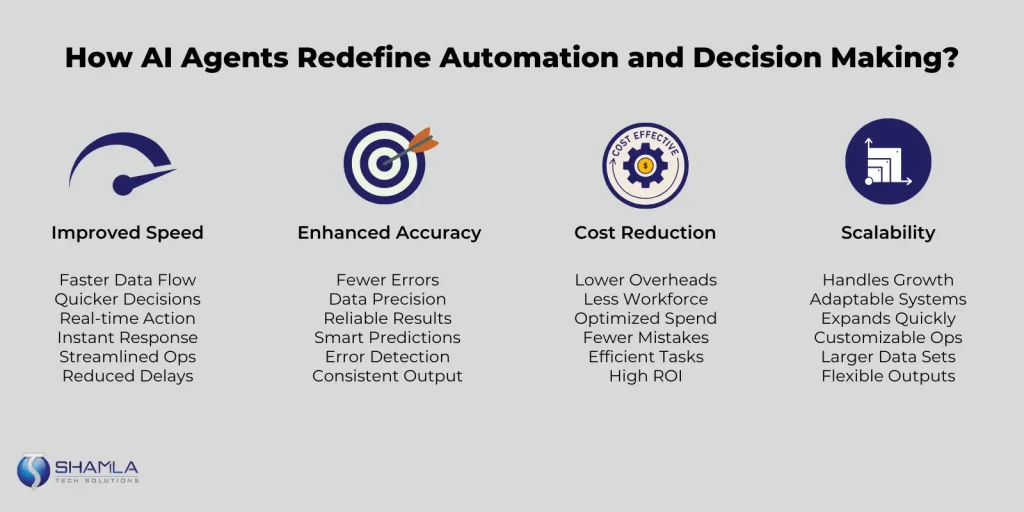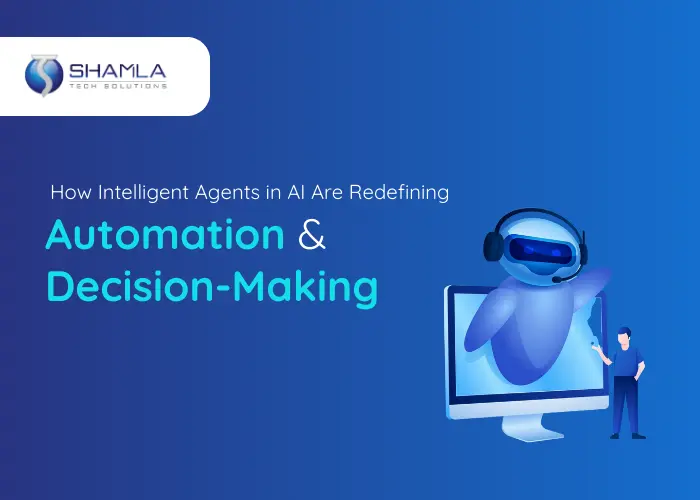The history of AI agents started in the 1950s with early work which was done on simple rule-based systems. As AI technology went on to grow exponentially, so did the complexity of these intelligent AI agents. The change from reactive agents to proactive, goal-driven agents in the 1990s was a key moment. These agents were created not just to react to things but also to act purely based on knowledge and long-term goals, which made them to be much more effective.
Today, an intelligent agent in AI is being used in many applications across several industries.These AI intelligent agents can now easily go through and understand huge amounts of data, learn from what they experience, and make decisions in real-time that businesses find to be super useful to improve their operations. AI agents also completely reduce the need for people to help, make things to work much better, and improve decision-making by quickly and accurately handling complex situations.
What is an Intelligent Agents in AI?
Intelligent agents in AI is a system designed to do tasks on its own, make decisions, and interact with its surroundings to reach certain goals. It senses its environment using sensors or data, processes this information, and takes action to change the surroundings or get the desired result. Unlike regular software that follows set instructions, AI agents use machine learning, neural networks, and natural language processing to analyze data, learn from past experiences, and adjust to changing situations. This ability to act and learn on its own makes intelligent agents important for modern uses like self-driving cars, smart assistants, and prediction systems that work without needing constant help from humans.
Intelligent AI agents make decisions by using simple programs that try to think like humans, including reasoning, understanding, and learning. In a self-driving car, the AI agent gets information from cameras, sensors, and GPS to see what is around it and make decisions, just like how a human driver would actually do. With the usage of machine learning, the agent in artificial intelligence can easily get better at making decisions based on what it has learned before. Similarly, AI agents like personal assistants (such as Siri, Alexa) make use of natural language processing to understand what people say, figure out what the situation is, and reply in a useful way. This ability to learn from a lot of data helps AI agents get better at doing tough tasks more accurately and faster, just like how humans make decisions.
The main features of an intelligent agent in AI are autonomy, reactivity, proactivity, and social ability, which are what set them apart from normal systems. Autonomy allows agents to work on their own without needing direct human help, which is very important in things like self-driving cars, where decisions have to be made in real time without human input. Reactivity is how an agent responds to changes in the environment. A chatbot can react to a customer’s question by understanding the situation and giving an appropriate response. Proactivity lets agents take action based on goals. Predictive maintenance systems are one example where agents can predict problems, like equipment failures, and take steps to fix them before they happen.
The social ability of intelligent agents lets them work with people or other agents to meet common goals. This is especially useful in areas like multi-agent systems or collaborative robots, where different agents work together to get a task done. In customer service, multiple AI agents can talk to users, share information, and adjust responses based on what the user says. Socially-aware agents can also work together in virtual teams, making work faster and decision-making better. These features make AI intelligent agents powerful tools in industries like healthcare, finance, manufacturing, and customer service, where they can do tasks, help with decisions, and drive innovation.
How Intelligent AI Agents Redefine Automation?

An intelligent agent in AI can now easily do many complex tasks on their own, the tasks that once actually needed a lot of human help. The main part of AI-driven automation is the agent’s real ability to sense its surroundings, process large amounts of data, make decisions, and take effective actions without needing any humans to directly control it. These agents also make use of smart systems like reinforcement learning, deep learning, and natural language processing to get much better at their work over time. With these amazing abilities, AI agents can easily handle many different jobs, such as managing supply chains, customer service, and maintenance. By doing all these tasks automatically, they speed up the work, improve accuracy, and make things to be more efficient while cutting down on human mistakes and labor costs too.
In customer service, AI chatbots use natural language processing (NLP) to understand and answer customer questions. They can handle everything from answering simple questions to helping with more complicated tasks. Unlike old systems, AI chatbots keep learning from each conversation, becoming better over time. This allows businesses to handle a lot of customer questions without needing extra human workers, providing 24/7 service with good answers. By automating these tasks, companies can lower wait times, make customers happier, and reduce costs.
Industrial robots in factories can now do many complex tasks like assembling, welding, checking, and packaging with high accuracy and speed. These robots which are powered by AI agents let them to adjust to changes, improve workflows, and learn from mistakes. This incredible ability to improve on their own helps cut down on downtime and makes work to be more flexible. As AI agents keep on improving, these robots will be able to handle even more difficult and dangerous jobs, making factories to be much safer and more productive.
The effect of AI agents on productivity and work efficiency is huge. With the undertaking of the repetitive, data-based, and decision-making tasks, AI agents can free up human workers and help them to focus on more important, creative, and strategic work. AI agents in finance can analyze a lot of data, find trends, and make trades in just a few milliseconds, doing it much faster and more efficiently than humans. In healthcare, an agent in artificial intelligence can help doctors to diagnose diseases, analyze medical images, and manage patient data, cutting down on mistakes and speeding up decisions. These improvements help businesses to save resources, make decisions faster, reduce costs, and, in the end, give them with higher profits.
How AI Intelligent Agents Help in Decision-Making?
Intelligent agents are changing the way decisions are made by helping businesses get very accurate, data-driven information. Powered by smart computer systems, these agents can process a large amount of both organized and disorganized data from different sources, finding patterns and connections that are not immediately visible to human workers. In areas like healthcare, finance, and marketing, AI agents help with predicting the future by using past data to make forecasts. By automating data analysis, intelligent agents reduce the time it takes to turn information into useful decisions, improve the accuracy of decisions, and make sure they match business goals. These abilities let businesses and workers make good decisions quickly, especially in urgent situations, helping their operations succeed.
In real-time situations, an intelligent agent in AI can help make quick decisions with the right information. For example, in healthcare, AI agents look at real-time patient data from devices, medical images, and past records to help doctors diagnose problems and suggest treatments. Smart computer systems, like deep learning models, help AI analyze many details quickly, giving doctors better and faster results than old methods. These agents can also decide which patients need urgent care by spotting important patterns in their data, improving decision-making in emergencies. Similarly, in finance, intelligent agents look at market changes, news, and social media in real time to make quick investment choices. By constantly checking data, they help finance experts act fast on chances or prevent problems.
In customer service, AI intelligent agents are very important for quick decision-making. AI chatbots and virtual helpers check customer questions, figure out what the customer wants, and give answers that fit the situation. These agents use natural language processing (NLP) to understand what the customer means, their feelings, and how urgent the request is. This allows them to handle everything from simple questions to more complicated problems. Real-time decision-making in customer service makes customers happier by cutting wait times and ensuring they get the right information. Also, AI agents in customer service can suggest solutions based on past conversations, learning and improving their answers over time to make the service better. Because of this, AI agents are changing service industries by improving efficiency and decision-making.
AI agents are also having a big effect on business strategies in many industries. By using data, companies can move from reacting to problems to planning ahead. AI-powered businesses are helping companies put smart systems in place that predict market changes, customer behavior, and problems that might come up. For example, AI agents in marketing use data to group customers, give personalized suggestions, and improve advertising in real-time. In supply chain management, AI agents predict demand, track inventory, and make delivery schedules better, helping to lower costs and improve service. These smart decisions, powered by AI, help businesses stay ahead of the competition, use resources better, and respond quickly to changes in the market.
In addition, AI agents are changing long-term business plans by automating complex analysis and creating a culture where decisions are based on data. In areas like retail, AI agents study customer information to find changing trends, seasonal demands, and what customers like. This lets businesses adjust their inventory and products before others do. In manufacturing, AI agents help make production schedules better, manage resources, and predict when maintenance is needed, all while matching daily operations with business goals. This leads to businesses that can quickly adjust to market changes, improve processes, and reduce waste. As AI improves, its role in decision-making will keep growing, giving companies powerful tools to help them stay successful for the long term.
The bottom line is that these Intelligent agents in AI are helping businesses to make better, faster decisions, especially in real-time situations, allowing them to make data-backed, quick, and smart choices. Whether in healthcare, finance, or customer service, AI agents use tools like machine learning, natural language processing, and predictive analytics to improve decision speed and accuracy. These abilities not only make everyday work better but also help businesses plan and act in smarter ways, making them more competitive and efficient. As more businesses use AI agents, they will play an even bigger part in driving success and new ideas.
The Future of Intelligent Agents in AI
Emerging trends in the technology of AI agents are quickly improving the abilities of AI in many industries. One of the most important trends is combining reinforcement learning with systems of multiple agents. These AI agents can work together to reach complicated goals by learning from their interactions with each other and their surroundings. In areas like self-driving cars and robots, agents are getting better at handling even more complicated tasks, such as working together and solving problems. Also, combining deep learning with edge computing lets AI agents process data closer to where it comes from, leading to faster decisions and less delay. This is especially important for tasks that need quick reactions.
The potential of AI agents is huge, especially in fields like healthcare, where AI agents help with diagnosing, planning treatments, and providing personal medicine. AI systems can now look at medical images, patient information, and genetic details to suggest treatments with a level of accuracy that can match or even beat human doctors. In finance, AI agents are changing the way trading systems work, catching fraud, and managing risks by analyzing huge amounts of data and making choices faster than older systems. The ability of AI agents to adapt will lead to ongoing improvements in these fields, bringing even more useful and effective results.
In manufacturing, AI agents are helping lead the change toward Industry 4.0, where smart factories combine automation, AI, and the Internet of Things (IoT). AI agents can now predict when machines will break down, make supply chains work better, and automate quality checks with great precision. These agents are always learning, which means they keep getting better over time, making things more efficient, saving money, and allowing for greater flexibility. As industrial robots get better, using AI agents will make production smoother, helping factories quickly respond to changing demands and increasing their ability to produce while keeping product quality high.
AI agent companies are anticipated to significantly transform how businesses manage customer service by making it more personalized and automating communication. By using conversational agents that understand language and sentiment, these companies are enabling AI agents to interact with customers in a way that is both helpful and sensitive to the context. These agents will not only respond to basic questions but will also take initiative to offer solutions on their own, improving the overall customer experience by adapting to each individual’s needs.
Looking ahead to the next decade, the role of AI agents in AI will become even bigger. The mix of 5G networks, cloud computing, and AI will let agents work in more complex and advanced settings. These agents will get better at working on their own, learning from real-time data to predict needs and make decisions with little help from humans. Fields like education will also benefit, with AI agents giving students personalized learning experiences. Smart cities will use these agents to improve how cities work, from traffic flow to energy use. As the technology continues to grow, AI agents will change how businesses work, making them more efficient, flexible, and ready for future challenges.
Conclusion
Intelligent agents in AI are actively automating many different complex tasks, handling large amounts of data, and giving real-time help with making decisions. These very capable agents are greatly improving how well things work, making them more accurate, and making operations faster. Businesses can really take advantage of these smart agents by easily adding them into their work processes, which helps to make things run more smoothly, reduce mistakes, and allow for quicker, better decisions. As these AI agents keep getting better, they will definitely bring more new ideas, higher productivity, and lower costs to many industries.
If you want to create your own AI intelligent agent, partner with Shamla Tech, a leading AI agent development company. We have worked with businesses worldwide, developing intelligent agents in AI that have optimized automation and decision-making, directly improving operations and driving success.
Contact us today for a free AI agent consultation and get a custom quote!








